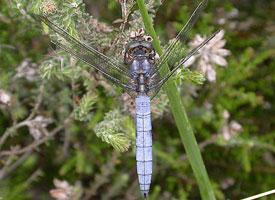
Váhy a míry
| Délka | od 41 do 45 mm |
|---|
Popis zvířete
The Southern Skimmer, scientifically named Orthetrum brunneum, is a fascinating species of dragonfly that belongs to the family Libellulidae. This captivating insect is widely recognized for its striking appearance and unique behaviors, making it a subject of interest among entomologists and nature enthusiasts alike.Adult Southern Skimmers boast an impressive wingspan that can reach up to 70 millimeters, providing them with excellent agility and speed in flight. The males of the species exhibit a distinctive powdery blue coloration on their abdomen as they mature, a feature known as pruinescence, which contrasts sharply with their otherwise brown and yellow body. This vibrant blue hue serves not only as a means of attracting females but also as a deterrent to potential predators. The females and immature males, on the other hand, display a more subdued color palette, featuring a brownish-yellow abdomen with black longitudinal stripes, which helps them blend into their surroundings and avoid detection.
One of the most remarkable aspects of the Southern Skimmer is its eyes. Like other dragonflies, it possesses large, multifaceted eyes that provide it with an almost 360-degree field of vision. This exceptional eyesight allows the Southern Skimmer to spot prey and predators from a distance, facilitating both hunting and evasion. Their diet primarily consists of smaller flying insects, which they catch in mid-air with incredible precision and agility.
The habitat of Orthetrum brunneum is typically associated with still or slow-flowing freshwater bodies such as lakes, ponds, and slow rivers. They prefer areas with abundant vegetation, both aquatic and terrestrial, which offer ample opportunities for hunting, resting, and breeding. The presence of reeds and tall grasses is particularly important during the breeding season, as females lay their eggs on or near these plants.
Reproduction in Southern Skimmers involves a fascinating aerial display, where the male grasps the female by the neck using specialized claspers at the end of his abdomen. The pair then engages in a tandem flight to the water, where the female deposits her eggs by tapping the surface with her abdomen, often while still in flight. This unique method of oviposition helps to ensure that the eggs are spread widely and reduces the risk of predation.
The life cycle of Orthetrum brunneum, from egg to adult, encompasses several stages and can last from one to several years, depending on environmental conditions. The larvae, known as nymphs, are aquatic predators that undergo a series of molts as they grow. Once fully matured, they emerge from the water and undergo a final molt, shedding their exoskeleton to reveal their adult form.
In conclusion, the Southern Skimmer is a remarkable creature that captivates with its beauty, agility, and complex behaviors. Its adaptation to a variety of freshwater habitats and its role in controlling insect populations highlight the importance of this species in maintaining ecological balance. As with many other insects, the Southern Skimmer faces threats from habitat loss and pollution, underscoring the need for conservation efforts to protect these vital components of our natural world.
Podobná zvířata
Nové fotografie zvířat
Top 10 zvířat
- Dolphin gull (Leucophaeus scoresbii)
- Diana monkey (Cercopithecus diana)
- Stone loach (Barbatula barbatula)
- Greek tortoise (Testudo graeca)
- Japanese macaque (Macaca fuscata)
- Moustached guenon (Cercopithecus cephus)
- Galápagos tortoise (Geochelone nigra complex)
- Russian tortoise (Testudo horsfieldii)
- Galápagos penguin (Spheniscus mendiculus)
- Common flying dragon (Draco volans)


